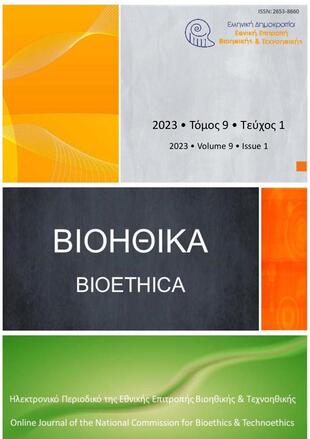Bioethical perspectives of the everyday living for people with dementia: from decision autonomy to caring for the future
Abstract
Dementia poses a challenge to individuals' good judgment and autonomy, while undermining their quality of life. Ethical issues are faced by people with dementia themselves, their carers and health care providers on a daily basis. Such aspects span a wide spectrum, including not only the serious issues of end-of-life decisions, but also simple everyday problems such as driving. The interdisciplinary approach to bioethical issues highlights dementia as an important and multifaceted social phenomenon. Changes in cognitive abilities and daily activities affect interpersonal interactions and family relationships. Patients, their social environment, and clinicians are called upon in a new context to work together towards decision making about the diagnostic process, daily living, care coordination, advance planning, or end-of-life interventions. The close relations between ethics and law are timeless, making it necessary to study ethical issues alongside legislation.
Article Details
- How to Cite
-
Lygnos, D., & Rethymniotaki, E. (2023). Bioethical perspectives of the everyday living for people with dementia: from decision autonomy to caring for the future. Bioethica, 9(1), 6–21. https://doi.org/10.12681/bioeth.34071
- Section
- Original Articles

This work is licensed under a Creative Commons Attribution 4.0 International License.
Authors who publish with this journal agree to the following terms:
- Authors retain copyright and grant the journal right of first publication with the work simultaneously licensed under a Creative Commons Attribution CC BY 4.0 License, which allows for immediate free access to the work and permits any user to read, download, copy, distribute, print, search, or link to the full texts of articles, crawl them for indexing, pass them as data to software, or use them for any other lawful purpose. Appropriate credit must be given by citing the author(s) and the original publication in this journal.
- Authors are able to enter into separate, additional contractual arrangements for the non-exclusive distribution of the journal's published version of the work (e.g. post it to an institutional repository or publish it in a book), with an acknowledgement of its initial publication in this journal.
We encourage authors to deposit their articles, as well as data underlying the publications, in institutional and/or other appropriate subject repositories.
Bioethica permits and encourages authors to archive the final publication pdf in institutional (e.g. the repository of the National Hellenic Research Foundation) or other appropriate subject repositories (e.g. SSOAR repository for social sciences), in compliance with institutional and/or funder open access policies, after publication in the BIOETHICA. Authors must provide bibliographic details that credit publication in the journal, as well as related funding details (when applicable).
Lists of institutional and other subject-based academic open access repositories can be found listed by country at the registry http://opendoar.org/countrylist.php
If your institution does not possess a repository you may deposit a copy of your paper at no cost with www.zenodo.org , the repository supported for open access research in the EU by the European Commission, through the project OpenAIRE (www.openaire.eu )



